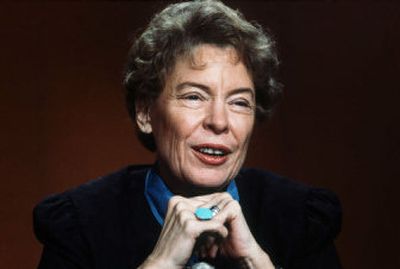Former U.N. ambassador dies at 80

WASHINGTON – Jeane J. Kirkpatrick, a Georgetown University political science professor who became the first woman to serve as U.S. ambassador to the United Nations and who was one of the chief architects of the muscular anti-Communist foreign policy that came to be known as the Reagan doctrine, died Thursday at her home in Bethesda, Md., where she was under hospice care. She was 80.
The cause of death was not immediately known.
“She defended the cause of freedom at a pivotal time in world history,” President Bush said Friday. “Jeane’s powerful intellect helped America win the Cold War.”
For many years a Cold War liberal, a Democrat in the tradition of senators Hubert H. Humphrey and Henry “Scoop” Jackson, Kirkpatrick became a neoconservative in the 1970s and then a Republican Party stalwart. An academic and a public intellectual who never held elective office, she briefly considered seeking the Republican presidential nomination in 1988.
She came to Ronald Reagan’s attention in 1979, when he read an article she had written for the neoconservative magazine Commentary, “Dictatorships and Double Standards.” In the article, she accused the Carter administration of abiding totalitarian enemies on the left while holding authoritarian allies in Latin America and elsewhere to a higher standard.
It was difficult, she wrote, to “democratize governments, any time, anywhere, under any circumstances” although “right-wing autocracies do sometimes evolve into democracies” but communist societies never do.
“This is incredible. Who is this person?” Reagan is said to have exclaimed.
The columnist George Will introduced the two at a dinner party at his Georgetown home in 1980, and Kirkpatrick eventually decided to endorse Reagan for president and to campaign for him. When he named her U.S. ambassador to the United Nations, she became the first Democrat to fill a Cabinet-level post in the administration. She was unanimously confirmed by the Senate.
She warned that she would not be “a ventriloquist’s dummy” at the United Nations, mouthing administration policy, and there were times when her willingness to speak her mind ruffled feelings not only at the United Nations but within the administration.
Although she arrived at the United Nations with no diplomatic experience, she quickly assumed a high-profile role. Her fellow envoys may have considered her arrogant and condescending, but they knew she had Reagan’s ear.
An influential voice in the development of administration policies toward Central America, she supported the military junta in El Salvador and was an ardent supporter of anti-Sandinista rebels fighting the leftist Sandinista government of Nicaragua. She helped develop the covert plan to provide $19 million in aid to the contras.
She also defended Israel’s invasion of Lebanon in 1982 and the American invasion of Grenada in 1983.